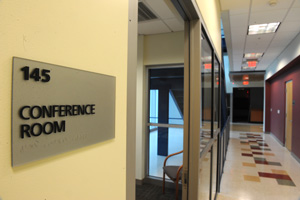
|
General: The grand opening of the two-story, 21,000-square-foot SUNY Fredonia Business Technology Incubator located in the business and waterfront district of Dunkirk, N.Y., culminates a dream in the making since 2006, when New York State provided $5.7 million in bonded funding and SUNY Fredonia President Dennis L. Hefner announced the new project.
Builder: Perry Construction of Erie, Pa.
Architect: JCJ Architecture of Hartford, Conn.
Consulting Engineer: Wendel Duchsherer, Inc., of Amherst, N.Y.
Cost: construction-- $4.87 million; design: $505,405
Date of Groundbreaking: October 2008
New Address: 214 Central Ave., Dunkirk, N.Y. 14048 (parking lot is behind the building and accessible from Washington Avenue)
Phone Number: 716-680-6009
Incubator timeline: The SUNY Fredonia Business Technology Incubator opened for business July 12, 2007, in its temporary location in Dunkirk’s Lorenzo Building at 338 Central Ave.
Director: Robert L. Fritzinger was appointed in November 2009, replacing interim director Kevin Kearns and previous director, Jeffrey Corcoran. For the past 20 years, Fritzinger has been involved in the creation, development, day-to-day management, financing and sale of multiple high-technology companies, including Voice Technologies Group, a cutting-edge telecommunications vendor which he successfully sold to Intel Corp. in 2000. He is Chairman of the Board of Zenhire, Inc., a search engine technology innovator which operates in the human resources industry and will be among the first tenants of the facility.
Tenant Eligibility: Any start up or spin off company that has a significant technology component within its business model, and makes a commitment to remain in Western New York (not necessarily Chautauqua County) after it “graduates.”
Tenants: Five new start-up companies — Van Buren Bay Cosmetics, Zenhire, mArté, the Fredonia Shale Institute, and Cell Text Data Systems (CTDS) — are among the inaugural class of tenants in the new facility. Noobis, Inc., is a tenant which graduated from the previous location.
Services: Each tenant company receives three years of targeted resources and shared functions such as accounting, marketing and legal services, in addition to mentoring. There are private and interconnected offices for up to 30 tenants, three dry labs (no chemicals or heavy machinery) and several common areas, including a “smart” conference room and classrooms. Located at 214 Central Ave. in downtown Dunkirk, the incubator is considered a true extension of the main campus of SUNY Fredonia. It gives tenants access to educational services as well as intern assistance, and in turn, will give students and faculty an excellent environment for both learning and teaching.
Economic Development:
“Our goal was to create an incubator that would promote economic growth in the Western Southern Tier of New York,” SUNY Fredonia President Dennis L. Hefner said. “We are accomplishing this by supporting young, innovative, technology-based companies. This is an unprecedented opportunity for heightened economic development within our region.”
Director Robert Fritzinger said, “These companies will create jobs, revitalize neighborhoods and strengthen regional economies once they are economically viable and capable of operating independently.”
Funding sources:
• New York State bonded funds ($5.7 million)
• NYSTAR [New York State Foundation for Science, Technology, and Innovation] ($605,000)
• John R. Oishei Foundation Challenge Grant appealing for matching gifts from local businesses ($300,000)
• Chautauqua Seed Fund of the Chautauqua County Industrial Development Agency ($125,000)
• Gifts from local businesses and industries for the Oishei matching grant (Donors to date include Graf Realty, Lake Shore Savings, NRG Dunkirk Power, Ralston Purina, and DFT Communications)
• Additional support from SUNY Fredonia, the U.S. Department of Housing and Urban Development, City of Dunkirk, and Northern Chautauqua Community Foundation.
A “Green” building:
The new facility incorporates numerous sustainable design elements, including a white roof and energy management system. Its mechanical systems were fully commissioned (tested and proven for efficiency) prior to opening, and the construction materials were recycled. Its laboratories are classified as “dry labs,” meaning that there are no harsh chemicals or heavy machinery involved. It was also erected in a dense developmental area and is well-integrated with existing downtown infrastructure, ensuring a social symbiosis with the community that makes it more environmentally friendly.



